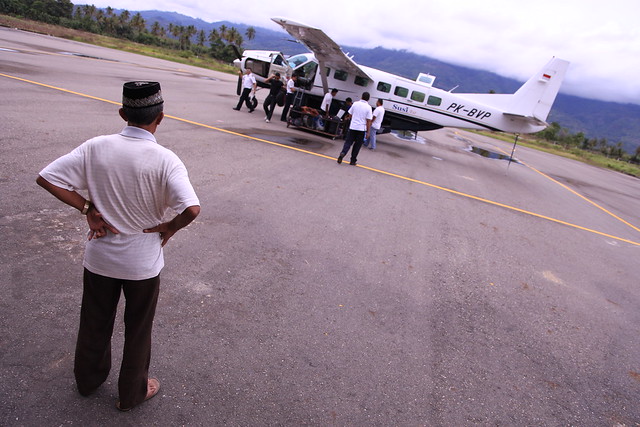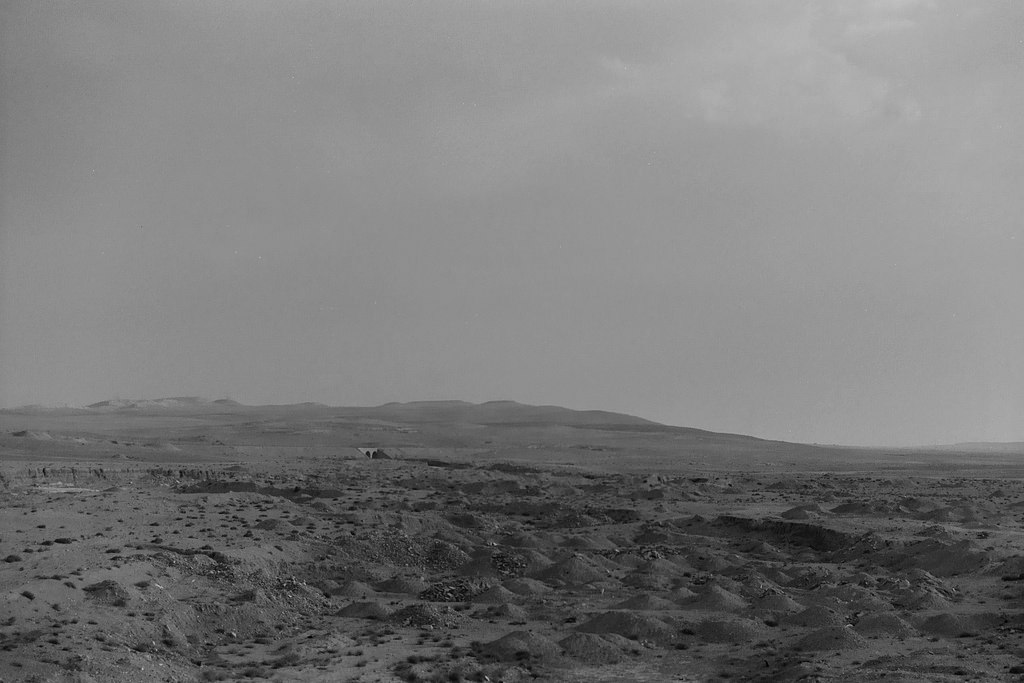We allowed three hours to get from Friendship Guesthouse, in the jungle village of Ketambe, to the airport at Kutacane, 35km to the the southeast. We were a few minutes late starting and the next bus took longer than expected but such delays were accounted for in our schedule. The bus was typical of the area, a light truck with a caged flatbed containing two facing benches. Some passenger space was sacrificed to allow for a big speaker unit with a ten-inch sub-woofer so we could all be treated to pop ballads on the road. At Kutacane we transferred into one of the small bechaks that are standard there. I rode on the back of the bike, with Maeve and the bags in the sidecar. We made aeroplanes with our hands and the driver seemed to understand that we wanted the airport. He drove out of town. Time wore on. We kept going, and going. After an age, we turned off the main road onto a smaller one. A river had overflowed and filled the road ankle-deep for a few hundred metres so we the bike had to wade slowly through it. If this wasn’t the way to the airport, we were seriously low on time. But finally, beyond some corn fields and over a rickety bridge, we saw a small ATC tower. The bechak drove through some half-open gates onto a gravel track and stopped outside the tiny terminal. A man checked our tickets and weighed our bags and, without any identification or bag scanning, we were left to wander the airport.
Although the Departures room was locked from the runway, Arrivals was open so whole families were enjoying playing on the asphalt. Late and unannounced, a klaxon sounded and two 12-seater prop planes floated into sight. An attendant unlocked the Departures door and a hundred people went out to greet the planes. The pilots looked almost alien, they were so slick in their clean, white uniforms and sunglasses. The co-pilot of our plane approached one of the passengers, carrying the passenger’s bag. He explained that loose bullets weren’t acceptable cargo, that they could explode and kill everyone. The man looked perturbed and disappeared into the terminal. The airport staff dutifully transferred the bullets into a plastic shopping bag and attempted to load them into the hold of our plane but the co-pilot stopped them. They seemed to get the message and instead opened the cockpit door and handed the bullets to the co-pilot. Incredulous, he didn’t bother explaining any more, he just closed the door on them without accepting their offer. I heard him say to the pilot, “why the fuck would we want bullets in the cockpit?!”
The pilots dropped us smoothly onto the runway and chatted with us about how to get to our destination of Pulau Weh, and where was good to stay there. As soon as our feet were on the asphalt a man in a luminous orange tabard approached us and engaged us in conversation. He escorted us into the terminal, removing his tabard and asking “teksi?” How it was acceptable for cabbies to tout for rides on the runway is something we may never know but I guess someone had pocketed some cash. The man then wouldn’t leave us alone, doing everything he could do seem helpful while pestering us to ride with him. We deliberately took another driver. That guy got us to our hotel, for an advertised fixed price of Rp85,000. I handed him a Rp100,000 note, he smiled and tried to shake my hand to close the deal. I gave him a knowing look and waited for him to go through the mime theatre of not having any change then having to go to a nearby food stall to get some. Finally alone from vulturous men, we quickly found a well-priced hotel room that had a big bed, clean bathroom with hot shower, A/C and even a TV this time. We welcomed the break from stinking pipes and a floor drain instead of a sink.
We found Banda to be clean, organised, calm and monied. Everything could be done or bought there. We sat in coffee shops and watched the middle classes hanging-out. We had read that the area was devoutly muslim but Maeve wasn’t going to start wearing a headscarf or covering her shoulders. I wondered where the ethical line should stand and felt a little uncomfortable at first but soon checked myself. Later some locals would tell us that it wasn’t something we should worry about.
Banda has an impressive modern museum dedicated to the 2004 tsunami. But when we got there it was inexplicably closed. We turned and walked back across the city for more tsunami tourism, to visit the boat on the house. But we were only halfway when we were stopped by a young lady, running and yelling after us. She shyly tried to find her words while her two friends joined her. They were all female, 19 and 20 years old, studying together at the local college. Their English teacher had challenged the class to find some native speakers and record a conversation with them. The topic had to be sport. We cancelled our plans and bought them juice at the local coffee shop. They used their smartphones to record the conversations. All three were embarrassed to ask our time but we were delighted finally to meet some young muslim women. They also knew and cared nothing about sport, like us, so we had to wing it through the interviews. Through failed first tries and the final recordings, we dutifully repeated our answers to similar questions. Maeve was addressed most of the time. She told them about her waterpolo playing. None of the girls could swim. I saw their young, round faces, framed by the floating polyester of their head scarves, backdropped by the busy traffic, sitting together only one street from the river, and visualised the sea filling a city full of people who had been raised by the coast but never learned to swim. On the final interview, when asked what sport she liked, Maeve was tired of talking about waterpolo. “I’m going off-piste here,” she said, “I like skiing”. The young interviewer looked foundered, skiing was utterly alien, none of them had ever seen snow before.
We still had time to visit the boat on the house. It was tucked away in a side street a short way from the river, where the banks are heavy with fishing vessels and shark skins drying in the sun. A wood and steel fishing boat had grounded perfectly upright on a concrete house. We read that over fifty people had used the boat to shelter from the flood. Someone had painted on a wall under the boat “Don’t broken // 26 Dec” – presumably a plea to preserve the boat from removal in the relief effort. It now served as a raw, iconic tourist sight.





Leave A Comment